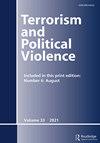The Class Conflict Rises When You Turn up the Heat: An Interdisciplinary Examination of the Relationship between Climate Change and Left-Wing Terrorist Recruitment
IF 2.1
2区 社会学
Q1 INTERNATIONAL RELATIONS
引用次数: 2
Abstract
ABSTRACT The increasing impacts of climate change have created a global humanitarian crisis. Growing populations, unstable political structures, and competition over scarce resources are generating unprecedented levels of insecurity. Capitalising on these complex situations, terrorist organisations are using the environment as a weapon of war, exploiting the strains and grievances exacerbated by climate change to increase support, aid recruitment, and incite violence. Often neglected within contemporary analyses is the potential impact of anthropogenic climate change on left-wing terrorist organisations. Consequently, the research presented in this paper takes an interdisciplinary approach, combining terrorism studies with disaster management to examine a specific type of security crisis that exists in this overlapping relationship between climate change and left-wing conflict. Three regional case studies of terrorist groups and activity are examined in detail—the Revolutionary Armed Forces of Colombia, the Shining Path in Peru, and Naxalites in India. The article reveals the complex issues that underlie climate disasters, focusing on the impact hazards such as deforestation, rising sea levels, extreme weather, glacial retreat, drought, famine, water scarcity, and migration have on left-wing terrorist recruitment and activity.当你打开暖气时,阶级冲突就会上升:对气候变化和左翼恐怖分子招募之间关系的跨学科研究
气候变化日益严重的影响已经造成了一场全球性的人道主义危机。不断增长的人口、不稳定的政治结构以及对稀缺资源的争夺正在造成前所未有的不安全程度。恐怖组织利用这些复杂的局势,将环境作为战争武器,利用气候变化加剧的紧张和不满来增加支持、招募援助和煽动暴力。在当代分析中,经常被忽视的是人为气候变化对左翼恐怖组织的潜在影响。因此,本文提出的研究采用跨学科的方法,将恐怖主义研究与灾害管理相结合,以检查气候变化与左翼冲突之间重叠关系中存在的特定类型的安全危机。本书详细考察了三个区域性的恐怖组织和活动案例——哥伦比亚革命武装力量、秘鲁的光辉道路和印度的纳萨尔派。这篇文章揭示了气候灾害背后的复杂问题,重点关注了森林砍伐、海平面上升、极端天气、冰川退缩、干旱、饥荒、缺水和移民等危害对左翼恐怖分子招募和活动的影响。
本文章由计算机程序翻译,如有差异,请以英文原文为准。
求助全文
约1分钟内获得全文
求助全文
来源期刊

Terrorism and Political Violence
Multiple-
CiteScore
5.60
自引率
8.30%
发文量
87
期刊介绍:
Terrorism and Political Violence advances scholarship on a broad range of issues associated with terrorism and political violence, including subjects such as: the political meaning of terrorist activity, violence by rebels and by states, the links between political violence and organized crime, protest, rebellion, revolution, the influence of social networks, and the impact on human rights. The journal draws upon many disciplines and theoretical perspectives as well as comparative approaches to provide some of the most groundbreaking work in a field that has hitherto lacked rigour. Terrorism and Political Violence features symposia and edited volumes to cover an important topic in depth. Subjects have included: terrorism and public policy; religion and violence; political parties and terrorism; technology and terrorism; and right-wing terrorism. The journal is essential reading for all academics, decision-makers, and security specialists concerned with understanding political violence.
 求助内容:
求助内容: 应助结果提醒方式:
应助结果提醒方式:


